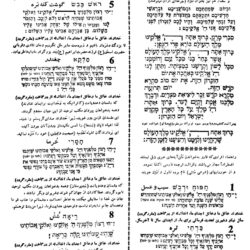| Source (Hebrew) | Translation (English) |
|---|---|
|
1 תַּפּוּחַ וּדְבַשׁ
יְהִי רָצוֹן מִלְּפָנֶיךָ הָ׳ אֱלֹקֵינוּ וֵאלֹקֵי אֲבוֹתֵֽינוּ שֶׁתִּתְחַדֵּשׁ עָלֵינוּ שָׁנָה טוֹבָה וּמְתוּקָה׃ (כי היא הנקרא שבת ביסוד) מֵרֵאשֻׁית הַשָּׁנָה וְעַד אַחֲרִית הַשָּׁנָה׃ |
1 Tapuaḥ, Apple in Honey
May it be your will, our God and God of our ancestors, to renew for us a year sweet as honey, from the beginning of the year to the end of the year. |
|
2 כַּרְתִּי
יְהִי רָצוֹן מִלְּפָנֶיךָ הָ׳ אֱלֹקֵינוּ וֵאלֹקֵי אֲבוֹתֵֽינוּ שֶׁיִכָּרְתוּ אוֹיְבֶיךָ וְשׂוֹנְאֶיךָ וְכָל מְבַקְשֵׁי רָעָתֵנוּ׃ (ואחר כך יאמר) תָּרוּם יָדְךָ עַל צָרֶיךָ וְכָל אוֹיְבֶיךָ יִכָּרְתוּ׃ (מיכה ה:ח) |
2 Kartei, Leeks[1] Cf. Abayyé in Talmud Bavli, Horayot 12a
May it be your will, our God and God of our ancestors, to cut off our enemies and all who seek to trouble us. (Afterward say:) “Your hand shall prevail over your foes, And all your enemies shall be cut down!”[2] Micah 5:8 |
|
3 קְרָא
יְהִי רָצוֹן מִלְּפָנֶיךָ הָ׳ אֱלֹקֵינוּ וֵאלֹקֵי אֲבוֹתֵֽינוּ שֶׁתִּקְרַע רוֹעַ גְּזַר דִּינֵנוּ וְיִקָּרְאוּ לְפָנֶיךָ זָכִיּוֹתֵינוּ׃ |
|
|
4 רוּבִיָא
יְהִי רָצוֹן מִלְּפָנֶיךָ הָ׳ אֱלֹקֵינוּ וֵאלֹקֵי אֲבוֹתֵֽינוּ שֶׁיִרְבּוּ זָכִיּוֹתֵינוּ וּתְלַבְּבֵנוּ׃ |
|
|
5 רֹאשׁ כֶּבֶשׂ
יְהִי רָצוֹן מִלְּפָנֶיךָ הָ׳ אֱלֹקֵינוּ וֵאלֹקֵי אֲבוֹתֵֽינוּ שֶׁנִּהְיֶה לְרֹאשׁ וְלֹא לְזָנָב. וְתִזְכֹּר לָנוּ (עֲקֵדָתוֹ וְ)אֵילוֹ שֶׁל יִצְחָק אָבִינוּ עָלָיו הַשָּׁלוֹם. בֶּן אַבְרָהָם אָבִינוּ עָלָיו הַשָּׁלוֹם׃ |
5 Rosh Kevish, Sheep’s head
May it be your will, our God and God of our ancestors, that we will be as the head and not as the tail. And remember for us the Akeda of Isaac, our ancestor, peace be upon them son of Abraham our ancestor, peace be upon them. |
|
6 סַלְקָא
יְהִי רָצוֹן מִלְּפָנֶיךָ הָ׳ אֱלֹקֵינוּ וֵאלֹקֵי אֲבוֹתֵֽינוּ שֶׁיִּסְתַּלְּקוּ אוֹיְבֶיךָ וְשׂוֹנְאֶיךָ וְכָל מְבַקְשֵׁי רָעָתֵנוּ׃ (ואחר כך יאמר) סוּרוּ מִמֶּנִּי כָּל פֹּעֲלֵי אָוֶן כִּי שָׁמַע הָ׳ קוֹל בִּכְיִי׃ (תהלים ו:ט) סוּרוּ סוּרוּ צְאוּ מִשָּׁם טָמֵא אַל תִּגְּעוּ צְאוּ מִתּוֹכָהּ הִבָּרוּ נֹשְׂאֵי כְּלֵי הָ׳׃ (ישעיהו נב:יא) |
6 Salka, Beets[5] Ibid.
May it be your will, our God and God of our ancestors, that our enemies and detractors disappear along with all who seek to trouble us. (Afterward say:) “Away from me, all you evildoers, for Hashem heeds the sound of my weeping.”[6] Psalms 6:9 “Turn, turn away, touch nothing impure as you depart from there; Keep pure, as you go forth from there, you who bear the vessels of Hashem!”[7] Isaiah 52:11 |
|
7 תָּמָרִי
יְהִי רָצוֹן מִלְּפָנֶיךָ הָ׳ אֱלֹקֵינוּ וֵאלֹקֵי אֲבוֹתֵֽינוּ שֶׁיִּתַּמּוּ אוֹיְבֶיךָ וְשׂוֹנְאֶיךָ וְכָל מְבַקְשֵׁי רָעָתֵנוּ׃ (ואחר כך יאמר) יִתַּמּוּ חַטָּאִים מִן הָאָרֶץ וּרְשָׁעִים עוֹד אֵינָם בָּרְכִי נַפְשִׁי אֶת הָ׳׃ (תהלים קד:לה) וּבְחַסְדְּךָ תַּצְמִית אוֹיְבַי וְהַאֲבַדְתָּ כָּל צוֹרְרֵי נַפְשִׁי כִּי אֲנִי עַבְדֶּךָ׃ (תהלים קמג:יב) |
7 Tamar, dates[8] Ibid.
May it be your will, our God and God of our ancestors, that our enemies and detractors will cease along with all who seek to trouble us. (Afterward say:) “May sinners disappear from the earth, and the wicked be no more. Bless Hashem, O my soul. Hallelu-Yah.”[9] Psalms 104:35 “As You are faithful, put an end to my foes; destroy all my mortal enemies, for I am your servant.”[10] Psalms 143:12 |
|
8 רֵיאָה
יְהִי רָצוֹן מִלְּפָנֶיךָ הָ׳ אֱלֹקֵינוּ וֵאלֹקֵי אֲבוֹתֵֽינוּ שֶׁיִּהְיוּ עַוֺּנוֹתֵינוּ קַלָה כְּרֵיאָה׃ |
8 Raya, lungs[11] Nili Simhai substitutes meringue in place of lungs. (“Also, those ladyfinger cookies that kind of taste like kichel”). Light and airy is the key — to retain the symbolic association with lungs.
May it be your will, our God and God of our ancestors, that our sins be as light as the lungs. |
|
9 רִמוֹן
יְהִי רָצוֹן מִלְּפָנֶיךָ הָ׳ אֱלֹקֵינוּ וֵאלֹקֵי אֲבוֹתֵֽינוּ. שֶׁנִּהְיֶה מְלֵאִים מִצְוֺת כָּרִמּוֹן׃ |
9 Rimon, Pomegranate May it be your will, our God and God of our ancestors, that we be full of mitsvot like a pomegranate. |
Sol’e nu Mobarak! سال نو مبارک — L’shanah Tova לשנה טובה!
Thank you to Nili Simhai for sharing the Farsi (Persian) Nusaḥ of this punful minhag — the order of eating auspicious foods and reading associated supplications for a blessed New Year during the festive meals of Rosh Hashanah. Profound thanks are also due to Rabbi Simcha Daniel Burstyn of Kibbutz Lotan for his translation.
If you can read Persian, please help to transcribe all of the Persian translations provided in the sourcetext image of this seder.
Thank you to Nili Simhai and Yosh Schulman for sharing the Farsi (Persian) Nusaḥ of this punful minhag — the order of reciting kavvanot (intentions) for the New Year. Profound thanks are also due to Rabbi Simcha Daniel Burstyn of Kibbutz Lotan for his translation. Please help the Open Siddur Project by helping to translate and transcribe all of the Hebrew and Farsi in this seder. Sol’e nu Mobarak!
Source

Seder Ahilat haSimanim – Rosh haShanah (Farsi) – from the collection of Nili Simhai and Yosh Schulman
Notes
| 1 | Cf. Abayyé in Talmud Bavli, Horayot 12a |
|---|---|
| 2 | Micah 5:8 |
| 3 | Ibid. |
| 4 | Ibid. |
| 5 | Ibid. |
| 6 | Psalms 6:9 |
| 7 | Isaiah 52:11 |
| 8 | Ibid. |
| 9 | Psalms 104:35 |
| 10 | Psalms 143:12 |
| 11 | Nili Simhai substitutes meringue in place of lungs. (“Also, those ladyfinger cookies that kind of taste like kichel”). Light and airy is the key — to retain the symbolic association with lungs. |


